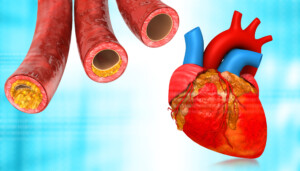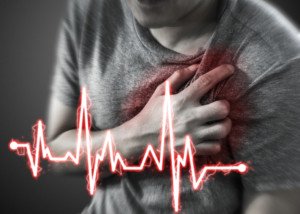
If you’re 21 or around this age and think you might have angina, go see a cardiologist.
“Yes, any age can suffer from acute coronary insufficiency, even millennials,” says Lance S. Burns, MD, emergency medicine specialist, of Legacy ER & Urgent Care, Frisco East location.
Just what is angina?
It’s chest pain resulting from insufficient blood flow throughout the heart.
Blood flow in the heart takes place via the coronary arteries.
These arteries branch from the aorta (the largest blood vessel in the body) and are essential for maintaining the heart’s function and overall cardiovascular health.
An inadequate blood flow is usually caused by narrowing of the coronary arteries due to plaque buildup or the so-called clogging or blockages.
This narrowing, called atherosclerosis, results from the accumulation of fatty deposits, cholesterol and other substances, and this is collectively known as plaque.
Over time, these deposits can harden and restrict blood flow, leading to reduced oxygen delivery to the heart muscle.
Angina is more likely to occur during physical exertion (“stable angina”), when the oxygen demands of the heart are increased.
But not enough blood is getting through, due to the smaller diameter of the inner arteries, thanks to the plaque buildup.
This situation can actually be present in a 21-year-old. Note the image below depicting the reduced diameter due to plaque buildup.

Shutterstock/Explode
Dr. Burns continues, “There are multiple factors involved with early-onset coronary syndromes.
“Genetics has a significant role. Lifestyle issues, particularly smoking and drug use (cocaine), are additional risk factors.
“In women, hormonal therapy and pregnancy are risk factors.
“Prizmental’s angina, ‘coronary spasm,’ has a higher frequency in younger, otherwise healthy individuals.”
The spasm has nothing to do with arterial blockages or heart disease, but will produce the chest pain because the spasms interfere with blood flow in the heart. This can happen in a person who’s only 21.
So though it’s very uncommon for 21-year-olds to have symptomatic heart disease, it’s certainly not unheard of in the medical world.
 Dr. Burns has over 30 years of experience, and he specializes in emergency medicine as well as family medicine. For more info: Legacy ER & Urgent Care.
Dr. Burns has over 30 years of experience, and he specializes in emergency medicine as well as family medicine. For more info: Legacy ER & Urgent Care.
 Lorra Garrick has been covering medical, fitness and cybersecurity topics for many years, having written thousands of articles for print magazines and websites, including as a ghostwriter. She’s also a former ACE-certified personal trainer.
Lorra Garrick has been covering medical, fitness and cybersecurity topics for many years, having written thousands of articles for print magazines and websites, including as a ghostwriter. She’s also a former ACE-certified personal trainer.
.









































